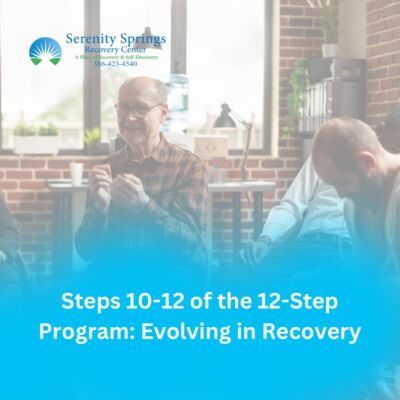Evolving in Recovery: A Comprehensive Examination of Steps 10-12 in the 12-Step Program

As individuals progress further along their journey of recovery, Steps 10-12 of the 12-step program emerge as essential components, fostering ongoing growth, spiritual development, and service to others. These steps involve continuous self-assessment, spiritual connection, and sharing the gifts of recovery with others. Below, we review the transformative influence of Steps 10-12 on the path to sustained sobriety and personal fulfillment.
Step 10: Continued to take personal inventory and when we were wrong promptly admitted it.
Process
Step 10 underscores the importance of ongoing self-reflection and accountability, encouraging individuals to regularly assess their thoughts, behaviors, and actions.
- Self-Reflection: Individuals cultivate a habit of regularly examining their attitudes, motives, and interactions with others.
- Accountability: They take responsibility for their mistakes and shortcomings, promptly admitting when they have erred.
- Amends: When necessary, individuals make amends promptly, seeking to repair any harm caused by their actions.
Benefits
- Self-Awareness: Step 10 promotes self-awareness and mindfulness, helping individuals stay attuned to their thoughts and behaviors.
- Personal Growth: Continuously taking inventory and admitting mistakes fosters personal growth and character development.
- Conflict Resolution: Promptly admitting wrongs can prevent conflicts from escalating and facilitate resolution.
Challenges
- Ego: Overcoming pride and defensiveness can be challenging when admitting wrongdoing.
- Consistency: Maintaining a regular inventory process requires discipline and commitment.
- Fear of Confrontation: Individuals may hesitate to admit wrongs due to fear of conflict or rejection.
Step 11: Sought through prayer and meditation to improve our conscious contact with God as we understood Him, praying only for knowledge of His will for us and the power to carry that out.
Process
Step 11 emphasizes the importance of spiritual connection and seeking guidance from a Higher Power through prayer, meditation, and reflection.
- Spiritual Practice: Individuals establish a daily practice of prayer and meditation to deepen their connection with their Higher Power.
- Seeking Guidance: They seek guidance on living according to their Higher Power’s will and aligning their actions with spiritual principles.
- Surrender: Individuals surrender their desires and ambitions, praying only for knowledge of their Higher Power’s will and the strength to follow it.
Benefits
- Spiritual Connection: Step 11 fosters a deeper spiritual connection and sense of purpose in life.
- Inner Peace: Regular prayer and meditation promote inner peace and serenity, even in times of adversity.
- Clarity: Seeking guidance helps individuals make decisions aligned with their values and spiritual principles.
Challenges
- Distractions: Maintaining a consistent prayer and meditation practice amidst daily distractions can be challenging.
- Doubt: Individuals may struggle with doubt or uncertainty about the effectiveness of spiritual practices.
- Surrendering Control: Surrendering to a Higher Power’s will may be difficult for those accustomed to relying solely on themselves.
Step 12: Having had a spiritual awakening as the result of these Steps, we tried to carry this message to alcoholics, and to practice these principles in all our affairs.
Process
Step 12 marks the culmination of the recovery journey, as individuals share their experience, strength, and hope with others and strive to live by spiritual principles in all areas of their lives.
- Service: Individuals engage in acts of service by reaching out to others struggling with addiction and offering support and guidance.
- Living by Principles: They integrate the principles of the 12-step program into their daily lives, applying them in their relationships, work, and community involvement.
- Personal Growth: Sharing their experience with others and practicing spiritual principles fosters continued personal growth and fulfillment.
Benefits
- Fulfillment: Step 12 brings a sense of fulfillment and purpose through service to others.
- Continued Sobriety: Sharing their experience helps individuals stay accountable and reinforces their commitment to sobriety.
- Legacy: By carrying the message of recovery to others, individuals leave a positive legacy and contribute to the well-being of their communities.
Challenges
- Fear of Rejection: Individuals may fear rejection or judgment when reaching out to others with the message of recovery.
- Time and Commitment: Engaging in service and practicing spiritual principles require time and commitment, which may be challenging to balance with other responsibilities.
- Burnout: Overextending oneself in service can lead to burnout if individuals neglect self-care and boundaries.
Shaping Lives: The Significance of Steps 10-12 in Journey of Recovery
Steps 10-12 of the 12-step program represent the culmination of the recovery journey, fostering ongoing growth, spiritual connection, and service to others. These steps offer individuals the opportunity to deepen their self-awareness, strengthen their spiritual connection, and make a positive impact on the lives of others. While they present challenges such as ego, doubt, and time constraints, the benefits— including personal growth, inner peace, and fulfillment—far outweigh the challenges. By embracing Steps 10-12, individuals not only achieve lasting sobriety but also contribute to the well-being of their communities and leave a legacy of hope and healing.




